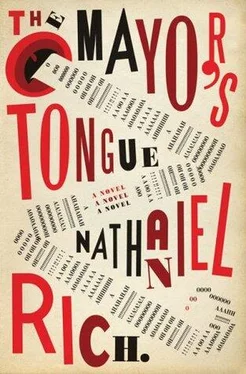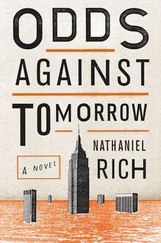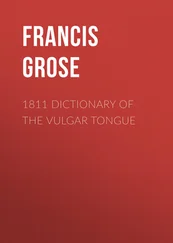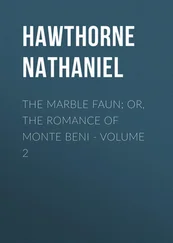There was a rapping on the front door, and he shifted abruptly, sending his foot into a stack of Eakins's out-of-print third novel, Better Days Will Haunt You. When the spine of an annotated hardcover edition landed on his forehead, he saw black spots wherever there was light.
"Dad? Are you in there?"
Eugene's head throbbed in protest.
"Dad? Open up!"
Eugene stumbled up, and tried to straighten out the piles around him, not noticing the many books he trod underfoot. The knocking on the door was insistent and increasingly frantic.
Eugene found the door and opened it. A young woman stood in front of him. When she saw Eugene, she opened her mouth, and then lurched back.
"Who the hell are you," she said. It was spoken like an accusation.
"Eugene. Um. Brentani."
"Where's my father? Is he all right?"
"He's coming back soon." He could not help noticing, in his muddled state, that she was beautiful, even as her pale lips formed a defiant moue and her arms dangled in a mix of exasperation and perhaps fear. Auburn hair falling to her shoulders, a wiry voice stifled in her long pale throat, and a thin red shirt missing the top and bottom buttons. A small white scar cupped the hollow beneath her left eye. The only trait she seemed to have inherited from Chisholm was the almost rabid intensity of her glare.
"I'm working for him," said Eugene. "Shelving books. Organizing."
Standing on tiptoe, the girl peered over his shoulder. After determining, from what she saw, that he was telling the truth, she seemed to take account of him for the first time.
"You're not doing such a good job of it," she said. "Can I—?"
She pushed past him into the crowded apartment.
"Were you sleeping?"
"I started reading and. . it was very warm."
"You don't look like the moving-man type."
"Hey — I'm stronger than I look," he said. He was joking but she didn't pick up on it, so he felt like an idiot. "I mean, it's just a job. It lets me see how other people live."
She ignored him and began cleaning up the mess of books scattered across the floor. After a minute she looked at him and laughed.
"Do you happen to know anything about the man who wrote all the books you're moving around?"
"Of course," he said. "Eakins? He's the greatest writer I know."
"Then you'll be sorry to see this." She opened her purse and handed him a folded newspaper. Eugene read the headline: u.s. to reduce case against scientist to a single charge. The article was about the trial of a former Los Alamos scientist accused of stealing nuclear weapons secrets.
"Oh, I see," said Eugene, relieved to make the connection. "This is like Eakins's short story about the nuclear scientist Velibor Topic, who feeds small radioactive pebbles to his neighbors' dogs."
She looked at him blankly.
" Was it Velibor Topic? Maybe I'm confused. It's early and I've been up reading stories all night."
"Look farther down."
He uncrinkled the newspaper and saw, at the bottom of the page, the headline constance eakins, legendary author of tobin the lesser and sacrament, is declared dead.
The article followed:
Constance Eakins, a colossus of the last American century, who changed the face of literature with his bold, imaginative novels, poems, plays, and essays, has been declared dead by authorities in Trieste, Italy, the last city in which he was known to have lived. Mr. Eakins's whereabouts have been unknown for three decades, ever since he disappeared during a hiking trip in the Carso, the high mountain countryside region surrounding the city. In Italy, the statute of limitation on a missing person case is thirty years — if a person is not found by that time, the case is closed and the state issues a death certificate. Mr. Eakins would have been eighty-three this year.
In recent decades, Mr. Eakins was rumored to have been working on a final novel — his twenty-sixth— provisionally titled "The Mayor's Tongue." No manuscript, however, has ever surfaced. "He has left a profound literary legacy, diabolically daunting and likely never to be matched," wrote Barney Dylan, the Director of the Eakins Center at Yale University, in his foreword to the Modern Library's new edition of Eakins's major novel trilogy, The Slayed, The Slaying, and The Slaughter.
With his Churchillian brio and Falstaffian appetites— for adventure, glamour, violence, sport, and most of all, women — Mr. Eakins may have been equally recognized for aspects of his life that had nothing to do with his writing. Over the years, he had stood accused, by critics and occasionally in a court of law, of excessive prodigality, brutalism, graft, lechery, whoremongering, thievery, murder, and even cannibalism (though these last two claims have been largely discredited). Mr. Eakins has long been described as a figure "larger than life," and it is likely that his legacy will prove larger than death as well.
Mr. Eakins was born on the bank of the Mississippi River in St. Rose, Louisiana, where his father worked in a sardine cannery. .
"You see?" said Chisholm's daughter, tapping the page in Eugene's hands. "I need to find my father. You can keep that copy, I have dozens. If you see Dad first, tell him I'll be back later."
"OK!" said Eugene, much louder than he had intended, to the slammed door.
Eugene sat down on a crate by the desk and gingerly unfolded the newspaper. Next to the obituary, the newspaper ran an old picture of the writer, taken in the late forties. The face of young Eakins had an angularity normally associated with the features of the desiccated elderly. Eugene wondered why they hadn't used a more recent author photo, such as the one that appeared on the dust jacket of The Man with Holes in His Cheeks, Eakins's last published memoir. Perhaps it was because the author, as photographed in the years before his disappearance, was not easy to look at. His head had become jowly and grotesquely elongated, his shaggy blond hair and beard darted out all sides of the frame, and his eyes were sunken from exhaustion. Young Eakins's face had just as many sharp angles, but they were distributed more favorably. They were there in his sharp widow's peak, in the diagonals that slanted downward from the corners of his mouth, in his broken-glass stare. Here was a man who had lived. As the obituary pointed out, by the time he was twenty-three — Eugene's age — he had swum the breaststroke in every continent (even Antarctica), mastered nine languages (including three dead ones), received a war medal, and conducted epistolary correspondences with such writers as H. L. Mencken, Yasunari Kawabata, and Simone de Beauvoir. Furthermore, as Eugene knew from the first volume of his memoirs, Gashes, Eakins had already amassed dozens of lovers, including six women who could not speak a single word of English (one of them a mute, hirsute Inuit), four men (one of them a heterosexual), and a first cousin.
On reading the obituary, Eugene realized that he knew more about Eakins's life than his own father's. He knew that Signor Brentani had been raised in Milan and had lived there until he met his mother, who was traveling with her Wellesley friends over the summer, and they eloped. But most of the years that his parents spent together were vague in his father's retelling. As long as he could remember, Eugene had been collecting details from that period, based on disclosures made during his father's rare moments of expansiveness — which usually coincided with episodes of inebriation or somnambulance — but ultimately he wasn't left with much information about either parent. He had seen only a couple of photographs from that time, and he wondered whether he would even recognize his father as a young man were he to pass him in the street. Were a young Signor Brentani now living in New York, would he frequent the same libraries, movie theaters, and subway stops that Eugene did? Would they strike up a conversation if they found themselves sitting next to each other in the upper deck at Shea Stadium, way at the top behind home plate, where they could see the stadium under their feet and the Long Island Sound through the orange iron grating in the distance behind them?
Читать дальше












